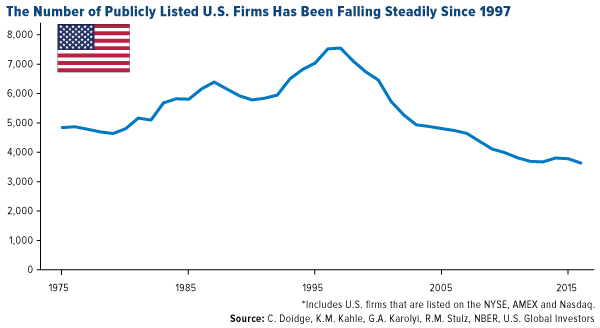
Elon Musk is no stranger to making controversial and outlandish comments, and his tweet earlier last week is no exception. As you probably know by now, the perennial entrepreneur announced to his more than 22 million Twitter followers that he is “considering taking Tesla private at $420.”
Despite the Herculean challenge—such a move would be the largest leveraged buyout in history—and despite Musk’s history of being a provocateur, Wall Street seemed to take his comment seriously. Tesla stock rose close to 11 percent last Tuesday to end at $379, a few bucks shy of its all-time high of $385, set in September 2017.
There are many reasons why investors should take note. For one, Musk and Tesla are now likely to face heightened scrutiny from securities regulators.
My reason for bringing it up is that, should Musk follow through and take the electric carmaker private, the already shrinking universe of investable U.S. stocks will lose yet another name.
This is a trend that cannot continue indefinitely.
As I wrote in May 2017, the number of publicly listed companies in the U.S. has fallen steadily since 1997. More companies have delisted, in fact, than gone public in every year of the past 20 years except one, 2013.
Put another way, the pool is getting smaller even while the population and economy are expanding.

The U.S. Has 5,000 Fewer Listed Companies Than It Should
In 1976, there were about 23 listed companies per 1 million U.S. citizens. Today, it’s closer to 11 per million.
That’s according to a new National Bureau of Economic Research (NBER) report by respected financial economist René Stulz, who adds that the U.S. has roughly 5,000 fewer companies listed on exchanges than you would normally expect, given the country’s size, population, economic and financial development and respect for shareholder rights.
Are we seeing the same phenomenon in other countries, developed or otherwise?









Leave A Comment